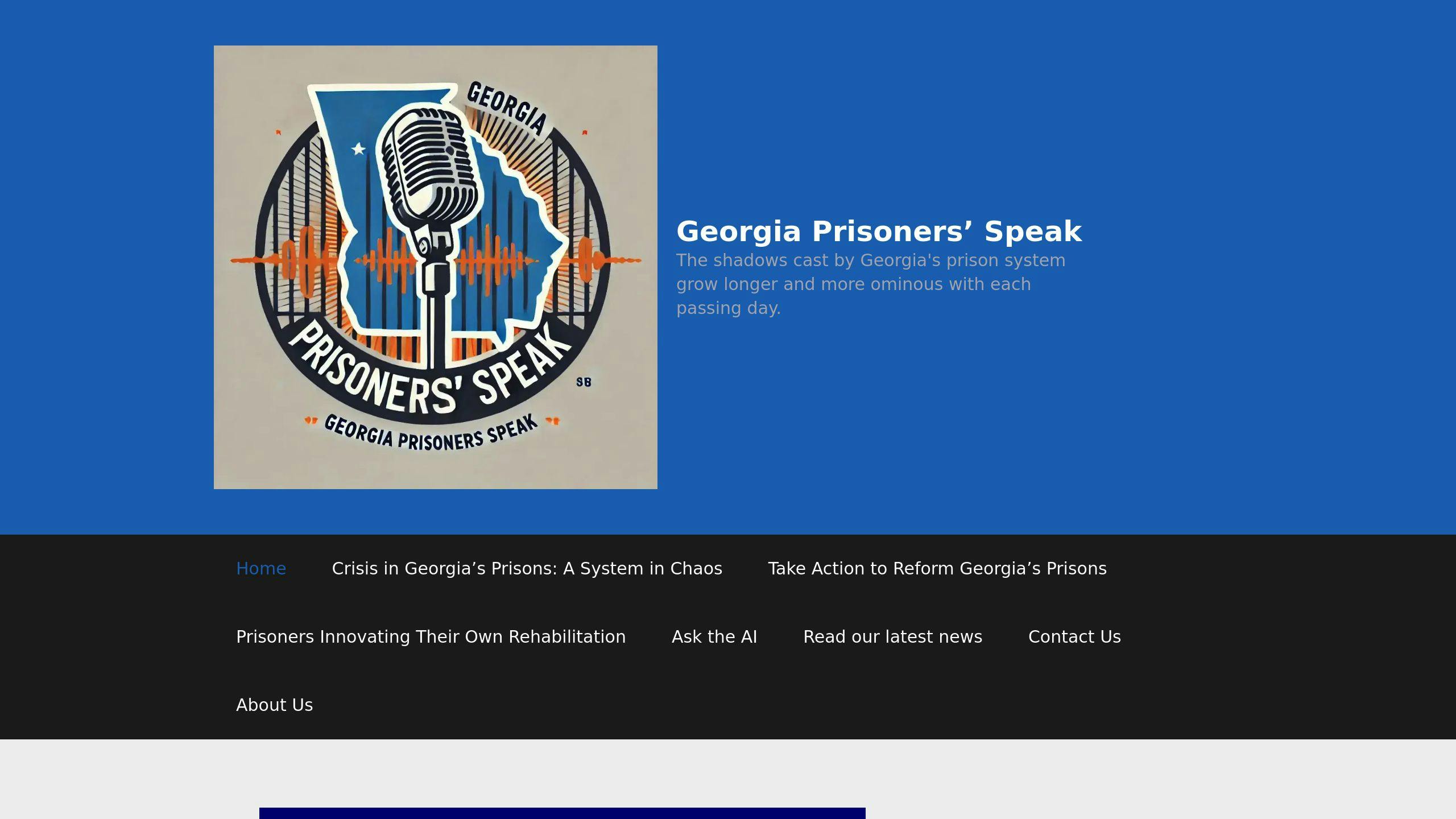Heat exposure is killing inmates in Georgia prisons. Many facilities lack air conditioning, and extreme temperatures have led to preventable deaths like that of Juan Carlos Ramirez Bibiano in 2021, who died after being left outside in 105°F heat for hours without water or shade.
Key points:
- Rising Death Rates: Every 10°F increase above average summer temperatures raises prison deaths by 5%.
- Systemic Neglect: Heat-related deaths are often misclassified as "natural causes."
- Constitutional Concerns: Extreme heat conditions may violate the Eighth Amendment’s ban on cruel and unusual punishment.
- Advocacy Efforts: Groups like Georgia Prisoners’ Speak (GPS) push for reforms, including air conditioning, heat safety protocols, and transparent mortality reporting.
Without urgent action, extreme heat will continue to endanger lives in Georgia’s prisons.
1. Failures in Georgia’s Prison System
Impact on Heat-Related Deaths
Georgia’s prisons, most of which lack air conditioning, face severe consequences during extreme heat. Research shows that for every 1°F increase above 85°F, the risk of daily mortality rises by 0.7%. Studies from Texas reveal that 13% of deaths during warmer months in similar conditions are directly tied to heat exposure [6]. These numbers underscore systemic neglect and raise serious concerns about potential constitutional violations.
Legal and Constitutional Implications
Federal courts have acknowledged that extreme heat in prisons can violate civil rights, making it the state’s duty to provide safe living conditions [5]. High temperatures also worsen mental health issues, leading to a 20% spike in violent incidents on extremely hot days [5]. While legal precedents highlight state responsibilities, the absence of effective enforcement leaves advocacy groups to take on much of the burden.
Effectiveness of Advocacy
Advocacy organizations work to shed light on these issues, but systemic resistance often blocks meaningful change. Despite clear evidence of the risks and legal obligations, Georgia’s prison system has been slow to adopt adequate cooling measures. Advocacy alone cannot resolve the underlying causes of these preventable tragedies without broader institutional reform.
These failures go beyond immediate health risks, raising questions about constitutional duties and basic human rights. As these conditions persist, the pressure for substantial reform becomes harder to ignore.
Heat Waves Worsen Conditions in Prisons with No Air Conditioning
sbb-itb-7858f51
2. Advocacy Efforts for Change (e.g., Georgia Prisoners’ Speak)

Georgia Prisoners’ Speak (GPS) is tackling systemic neglect and legal violations in Georgia’s prison system. The organization argues that the lack of cooling measures violates the Eighth Amendment, describing it as cruel and unusual punishment. GPS works to push for reforms using public awareness campaigns and data-driven strategies.
One major issue GPS has exposed is the Georgia Department of Corrections‘ failure to provide monthly mortality reports – documents that previously offered insight into causes of death [1].
The tragic death of Juan Carlos Ramirez Bibiano, who passed away after being left in an outdoor cell during extreme heat, has become a focal point for GPS’s campaign to reform outdoor confinement policies [1][2]. Research linking heatwaves to a 5.5%-7.4% increase in prison deaths highlights the urgency of these reforms [3].
GPS is focusing on several reform areas:
| Reform Priority | Current Status | Advocacy Goal |
|---|---|---|
| Air Conditioning | Limited to few facilities | Installation in all housing units |
| Heat Safety Protocols | Inconsistent | Standardized statewide |
| Mortality Reporting | Recently restricted | Full transparency |
The organization amplifies the voices of prisoners and their families, using its platform to push for accountability. Its website empowers citizens to join the call for prison reform, sharing reports, images, and videos that expose harsh prison conditions.
While GPS has made progress in raising awareness, a critical question remains: will these efforts lead to meaningful, long-term change?
Strengths and Weaknesses of Systemic and Advocacy Responses
Systemic and advocacy responses each bring their own strengths and limitations when addressing heat-related deaths in Georgia’s prisons. Their effectiveness depends on how well their unique capabilities are utilized.
| Response Type | Strengths | Weaknesses |
|---|---|---|
| Systemic (Institutional) | • Authority to enforce changes • Access to infrastructure and resources • Ability to create formal protocols | • Inconsistent enforcement and bureaucratic delays • Lack of transparency • Poor maintenance practices |
| Advocacy (e.g., GPS) | • Effective public awareness efforts • Legal challenges to systemic issues • Direct connection with affected families | • Limited power to enforce immediate changes • Resource constraints • Dependence on external influence |
Systemic responses often struggle with outdated infrastructure and enforcement issues. For example, the tragic case of Juan Carlos Ramirez Bibiano highlights ongoing failures to protect inmates, despite existing institutional safeguards [1][2]. Advocacy groups like Georgia Prisoners’ Speak (GPS) have stepped in to fill these gaps, focusing on campaigns for air conditioning installations and transparent reporting of deaths. Their work shows how advocacy can push for meaningful changes within the system.
The combination of systemic and advocacy efforts has led to progress in several areas:
- Advocacy-driven pressure has led to infrastructure upgrades.
- Exposing reporting flaws has improved accountability.
- Heat safety protocols are being developed, though inconsistently applied.
Data reveals that many heat-related deaths are either underreported or misclassified, emphasizing the urgency for action [3]. GPS’s documentation of these incidents has been instrumental in pushing for reforms, though systemic implementation remains uneven.
Solving these issues calls for a coordinated approach that leverages the authority of institutions while maintaining the persistent pressure and oversight provided by advocacy groups.
Conclusion
Heat-related deaths in Georgia prisons point to deep-rooted neglect, an issue advocacy groups like GPS are working to tackle by pushing for updates to infrastructure, improved safety measures, and greater transparency. These tragedies highlight larger systemic problems that demand immediate and collective action.
Although groups like GPS have raised awareness, progress toward lasting change has been uneven and remains a pressing need. The failure to address these issues underscores the vital role advocacy organizations play in exposing neglect and advocating for reforms. With heat indexes reaching 90-103°F, the risks to inmates are dangerously high, making prompt action a necessity [4].
Preventing further heat-related deaths requires consistent pressure for reform and actionable solutions. These accounts show the devastating human cost of neglect, calling for urgent and meaningful change. A combination of systemic improvements and strong advocacy is the only way Georgia’s prisons can protect incarcerated individuals from the life-threatening dangers of extreme heat.
